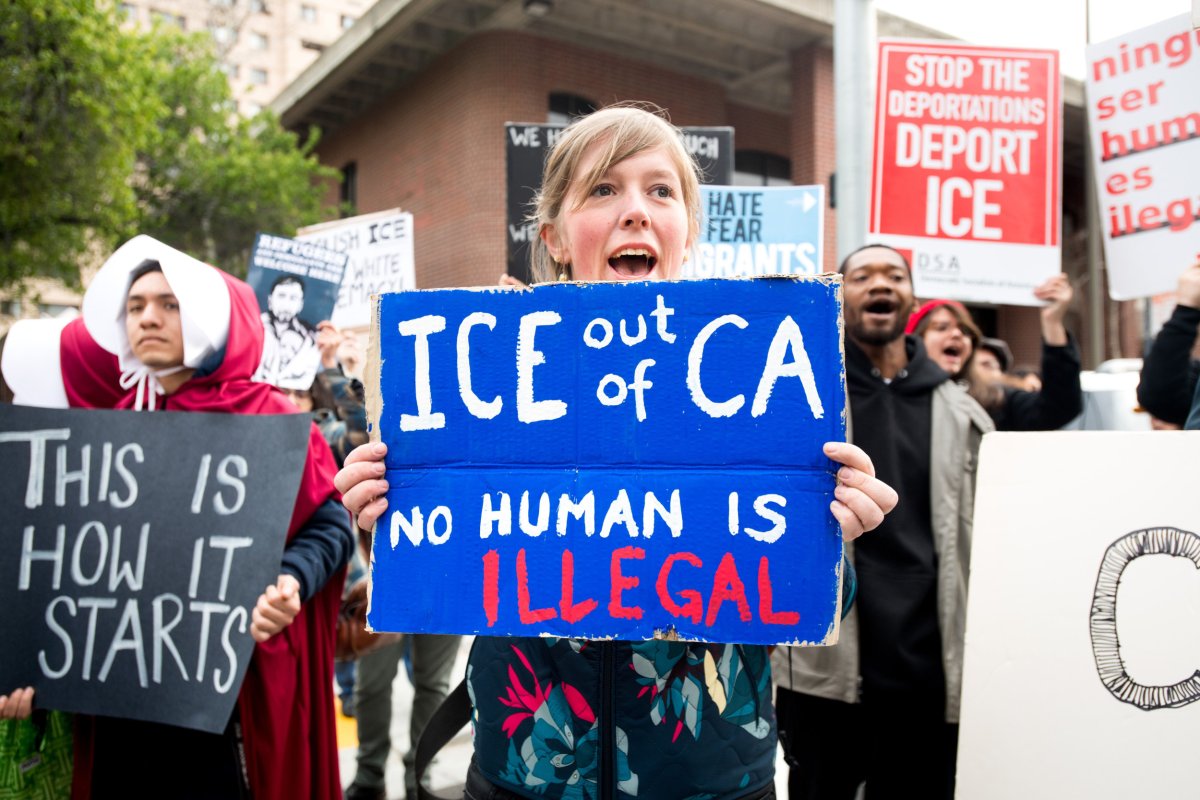California is gearing up for President Donald Trump's immigration crackdown, which includes mass deportations and sweeping raids targeting undocumented immigrants.
Tougher policies to address illegal immigration and strengthen border security were central to Trump's 2024 campaign, with the Republican candidate promising to implement the largest mass deportation program in U.S. history.
Upon returning to office on January 20, the president signed a series of executive orders to "seal the border," and Immigration and Customs Enforcement raids have begun nationwide, resulting in hundreds of arrests.
As the administration moves forward with its hard-line immigration agenda, advocates in California are mobilizing to protect immigrant communities from potential raids and deportations.

Immigrant rights advocates have been hosting workshops and sharing legal advice on social media with communities about knowing their rights and how to plan in the event that immigration enforcement officers turn up at their front doors, schools or places of employment.
Gina Amato Lough, the directing attorney at Public Counsel's Immigrants' Rights Project, told Newsweek: "We are mobilizing to defend immigrant communities against Trump's anti-immigrant agenda and are more prepared than we were for his first administration.
"We've been offering 'Know Your Rights' training throughout Los Angeles and working with individual clients to help them avoid becoming targets. We've also been collaborating with our partners to pass policies, such as the Los Angeles Sanctuary Ordinance, to protect immigrant communities from ICE enforcement. This time, there's a strong and coordinated effort to protect immigrants from unjust policies on day one."
Newsweek has contacted the White House for comment via email.
In their fight to shield immigrants from federal raids, organizations are also creating new resources to support California's undocumented residents. The Immigrant Defenders Law Center (ImmDef) has launched a rapid response legal resource hotline to assist Southern California residents detained by immigration authorities.
Laura Urias, ImmDef's program director, said in a statement: "Detention separates families and exposes people to abuse and sometimes even death. California welcomes immigrants who come to our state seeking safety or to reunify with family, and those new residents strengthen our economy and our communities.
"The Trump administration's barrage of executive orders is meant to instill fear and sow chaos. When leadership fails us, we must build community power. ImmDef has created this hotline to stand with Southern California's immigrant residents because no immigrant should stand alone in the face of an anti-immigrant federal administration."
California is uniquely equipped to go toe-to-toe with the second Trump administration over its immigration agenda, as the state possesses the second-largest Department of Justice in the country.
State Democrats reached a $50 million agreement to strengthen legal defenses against the Trump administration, with half allocated to combat potential mass deportations and the other half to support legal nonprofits and immigration services.
White House officials told Newsweek ahead of the inauguration that Trump planned to sign 10 executive orders aimed at tightening border security and cracking down on illegal immigration.
The executive orders include deploying U.S. troops to the southern border, ending birthright citizenship for children of illegal immigrants, dismantling programs initiated under President Joe Biden and taking steps to target transnational criminal gangs.
California Senator Alex Padilla, a member of the Senate Judiciary Subcommittee on Immigration, Citizenship and Border Safety, said Trump's flurry of executive orders targeting immigrants was sowing fear in communities.
"All Americans will feel the impacts of Trump's anti-immigrant agenda, creating chaos and fear in communities across our country, while also driving up costs for businesses and consumers. We can all agree that we need a secure and orderly border; however, these executive actions only further complicate that effort—and many of them violate the rights guaranteed by our Constitution. So make no mistake: it won't be long before a policy of chaos costs the American people," Padilla said in a news release on Tuesday.
Legal experts have said Trump's executive order to end birthright citizenship is unlawful.
"Trump's executive order seeking to outlaw so-called birthright citizenship is itself unlawful and will be easily struck down. The constitutional principle is clear and well-settled. The 14th Amendment states that 'all persons born or naturalized in the United States are citizens of the United States,'" Bennett Gershman, a professor of law at Pace University, told Newsweek.
He added: "The Supreme Court in U.S. v. Wong Kim Ark (1898) held that 'a child born in the United States of parents of Chinese descent but have permanent domicile and residence in the United States automatically becomes a U.S. citizen at birth.' Mr. Trump may not like the constitutional rule. But however much he would like to, he does not have the power to flout the Constitution. He would need to get Congress and the states to amend the Constitution to implement his objective."

The Harbor Institute for Immigrant and Economic Justice has responded to the Huntington Beach City Council's move to declare itself a "non-sanctuary city" and its lawsuit against California's sanctuary law, the California Values Act (SB 54).
On Tuesday, the city council unanimously voted for Huntington Beach Mayor Pat Burns' proposal to designate the city a "non-sanctuary" jurisdiction, aligning with Trump's mass deportation policies.
"California and federal courts have already ruled that the state's sanctuary law is constitutional and that Huntington Beach must follow the rule of law. In 2020, the U.S. Supreme Court also declined to hear challenges against it. Huntington Beach City Council's challenge to state law is purely performative and will be defeated again," the Harbor Institute said.
The institute further criticized Huntington Beach politicians for what it called a "hate circus," accusing them of focusing on immigrants rather than addressing real public safety concerns.
"Local governments have both the ability and the responsibility to effectively strengthen public safety by meaningfully investing in local libraries, redesigning streets to prioritize pedestrians, or developing more mobility and transportation options for residents—addressing tangible and urgent public safety problems. Instead of focusing on these life-or-death issues that residents face every day, politicians are wasting their energy blaming immigrant and refugee neighbors, undermining sanctuary policies that have been proven to decrease crime, and attacking the constitutional due process protections in our sanctuary state law, which have withstood numerous legal challenges over the past several years," the institute said.
Advocates argue that the state's sanctuary policies are essential for protecting all residents, including immigrants. Senate Bill 54, which passed in 2017, ensures that local authorities cannot hold individuals for immigration enforcement without a warrant and prohibits most law enforcement agencies from sharing immigration statuses with federal authorities. The Ninth Circuit Court of Appeals upheld the law in 2019 after a legal challenge from the first Trump administration, confirming that states had the right to implement their own immigration policies without federal interference.
Proponents of sanctuary laws point to research showing that immigrants—both documented and undocumented—tend to commit crimes at significantly lower rates than native-born citizens.
Immigrants are "significantly less likely" to commit crimes than those born in the United States, a recent study by Northwestern University found. Data also shows significant contributions of immigrant communities to California's economy and public welfare.
Undocumented residents in the state contribute an estimated $8.5 billion in state and local taxes annually, according to the Institute on Taxation and Economic Policy.
Padilla told Newsweek before the inauguration, "Immigrants have always been an important part of our nation's workforce, critical to the growth of our economy, and vital to ensuring our global leadership in specialized industries."
The American Immigration Council estimates that Trump's mass deportation policy could impose a one-time cost of $315 billion on the United States. Additionally, deporting 1 million individuals annually could lead to yearly expenses as high as $88 billion.
In 2021, about 69 percent of California's undocumented immigrants had been in the U.S. for more than a decade, and many worked in essential sectors that kept the state's economy running. Advocates say these long-term residents, who are integral to California's cultural and economic fabric, remain vulnerable under the specter of federal immigration enforcement.
As the Trump administration prepares for another round of aggressive immigration policies, California's leaders and advocacy groups are reaffirming their commitment to defending the rights of immigrants—with a focus on ensuring that families are not torn apart and that everyone, regardless of immigration status, can live without fear.




















 English (US) ·
English (US) ·